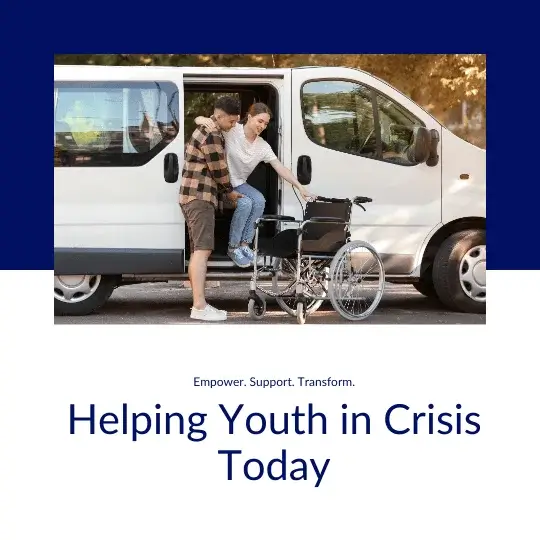Help Youth in Crisis
Visit our main page here or call us at (970) 405-2675 to get involved. Fill out the form here to help youth in crisis.
Understanding the Challenges Youth in Crisis Face
Youth in crisis often encounter overwhelming obstacles that jeopardize their futures. These challenges include homelessness, mental health struggles, and lack of access to education. Without intervention, their chances of building stable, healthy lives diminish significantly.
Helping youth in crisis involves addressing these root causes. For instance, offering shelter and counseling provides immediate relief, while educational programs create long-term solutions. By intervening early, we can prevent these challenges from escalating and help youth regain stability and hope.
Why Support Matters for Youth in Crisis
Supporting youth in crisis is essential for their well-being and personal growth. Many young people lack the resources or guidance to navigate their difficulties alone.
For example, a teen facing homelessness may struggle to stay in school or find a job. Your help ensures they have access to necessities like food, shelter, and educational support. Moreover, mentorship programs provide the emotional encouragement they need to rebuild their lives.
The Role of Community in Supporting Youth
Communities play a pivotal role in helping youth in crisis. When people come together to provide support, the impact is profound. For instance, local organizations often work with schools, shelters, and businesses to create a network of care.
These efforts include hosting workshops, funding scholarships, and offering job training. Consequently, youth gain the skills and confidence needed to overcome their challenges. By working together, communities create safe spaces where young people can thrive.
Stories of Resilience and Transformation
Consider a young man who once lived on the streets with no hope for the future. Through a community program, he received housing, therapy, and job training. Today, he is employed and mentoring other youth in similar situations.
Stories like his highlight the resilience of youth in crisis and the power of collective support. They show that with the right resources, every young person has the potential to succeed. These transformations inspire continued efforts to provide help and guidance.
How Programs for Youth in Crisis Work
Programs designed to help youth in crisis focus on addressing both immediate and long-term needs. Emergency shelters provide safety, while counseling services support mental health.
Additionally, educational initiatives help youth catch up on missed learning opportunities. For instance, tutoring programs ensure they can achieve academic success despite past struggles. Furthermore, job training equips them with skills for financial independence. These programs aim to give youth the tools to build better futures.
The Long-Term Benefits of Helping Youth in Crisis
Helping youth in crisis creates a ripple effect of positive change. When young people receive the support they need, they are more likely to lead successful, fulfilling lives.
Moreover, they contribute to their communities by sharing their experiences and helping others. For example, many former program participants become mentors or advocates for change. By investing in these youth, we strengthen entire communities and create a brighter future for all.
How You Can Make a Difference
Your involvement can have a significant impact on the lives of youth in crisis. Whether through donations or volunteering, every effort counts.
For example, contributing to local shelters or youth programs ensures they have the resources needed to continue their work. Additionally, mentoring a young person can provide invaluable guidance and support. Together, we can make a lasting difference in their lives.
In Conclusion
Helping youth in crisis is about more than providing temporary relief—it’s about building pathways to hope and opportunity. With your support, these young people can overcome their challenges and create brighter futures. Together, we can give them the care, stability, and encouragement they need to thrive.

